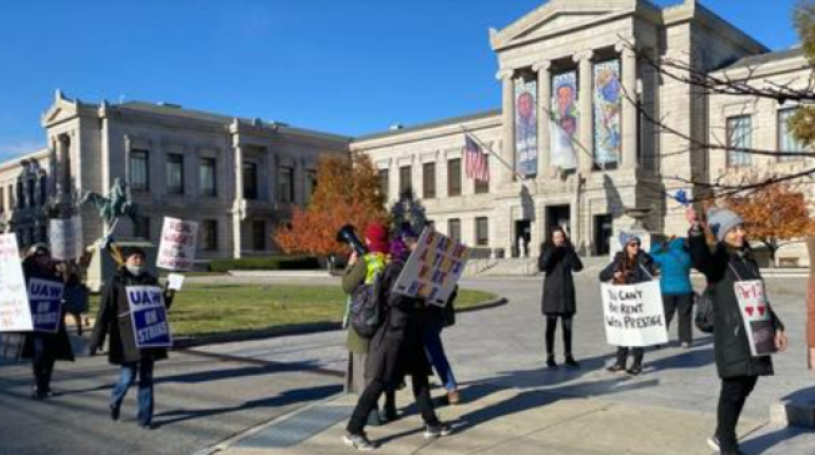MFA Boston workers who unionised go on strike
On Wednesday the Museum of Fine Arts Boston Union, which represents more than 200 staff members at the Museum of Fine Arts, Boston, staged a one-day strike over issues including wages and job security. The strike began at 8:30am at the MFA’s Huntington Street entrance.
Since April, the union and MFA management have been involved in a contract negotiation process that has resulted in hearings held by the National Labor Relations Board. The process has been costly for both parties as it dragged out for months, according to Maida Rosenstein, the president of United Auto Workers 2110, which is affiliated with the MFA workers and others at several US museums.
“Negotiations have been ongoing, but they have been painfully slow with very little progress, particularly compared to other negotiations that I have been in,” says Rosenstein . “It took them a very long time to respond to our compensation proposal. And when they did, their response was so bad and so backward that we don’t even know where to go with it.”
Over 96% of the MFA union’s members—who include educators, library workers, curators, conservators, public-facing staff and other administrative and professional staff—voted to picket outside the museum today. The one-day strike is intended to get management onboard with the union’s demands for greater workplace diversity, requiring union membership and better working conditions, among other issues.
In November of 2020, MFA employees elected to unionise by a vote of 133 to 14. Efforts to form the union had begun in 2019. Many MFA workers have not had a pay increase since the start of the pandemic. Following the COVID-19 outbreak, MFA management enforced multiple rounds of layoffs and furloughs. Many staff members have had to take on more work with fewer resources.
“The museum isn’t willing to guarantee salary increases for staff until 2024—and even then they’ll only commit to a 1.75% raise,” says Haley Rayburn, a union negotiating committee member and MFA communications worker. “We shouldn't have to be bargaining over things like union rights, job security, severance and layoff protections. We just want a say in our employment conditions.”
On 12 November, in anticipation of the strike, a spokesperson for the museum released a statement that said, “Despite serious financial challenges to the arts and nonprofit sector stemming from the pandemic and a slow return to normalcy, our goal has always been to recognise and support our employees, including a commitment to investment in compensation.”
While this is the first strike of newly formed unionised MFA workers, in 2015 MFA security staff affiliated with the Museum Independent Security Union (MISU), protested for three weeks in response to new training and scheduling protocols.
Many of the points of contention in the current negotiations have raised issues of pay inequality and other insecurities that cultural workers have faced for decades. The Museum of Fine Arts Boston is one of the latest cultural institutions where workers have unionised. In the last two years, workers at at least 11 US museums, including the Whitney Museum of Art, the New Museum, the Guggenheim, the Philadelphia Museum of Art, and the Museum of Contemporary Art in Los Angeles, have formed unions. Employees at the Art Institute of Chicago museum and school recently filed petitions to hold a union election. The trend extends beyond the cultural sector; last year, for the first time in more than a decade, the share of US employees who were union members increased.
“There’s been a shift as we’ve opened up the sector with people from different backgrounds,” said Eve Mayberger, an assistant objects conservator who is also a bargaining committee member. “This is a moment of reckoning for the larger cultural heritage sector.”
Mayberger and others see the strike as a way to press the issues they care about while also showcasing their dedication to the institution. ”We do really want to work with the MFA [for the] long term,” Mayberger added. “We see this first contract as just that––the first stage of creating that long-term relationship.”

